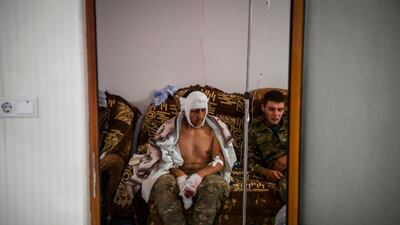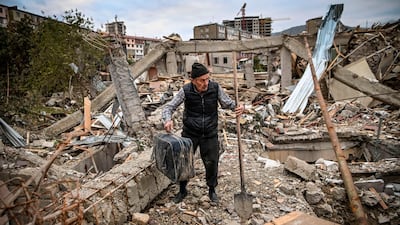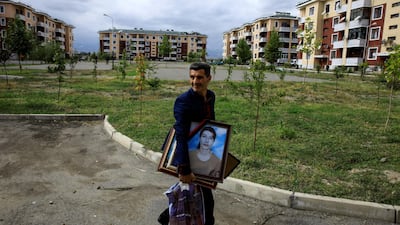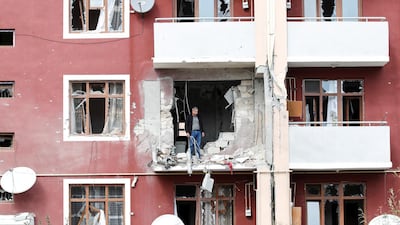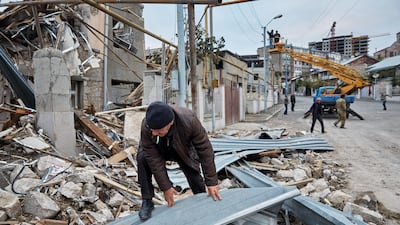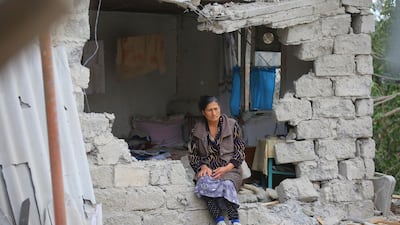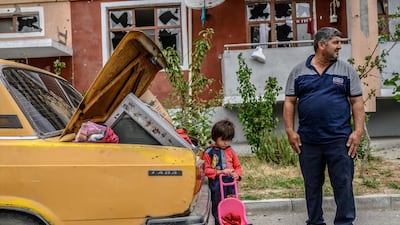Azerbaijan said on Wednesday it had destroyed missile launchers inside Armenia that were targeting its cities, as fierce fighting over Nagorno-Karabakh risked widening beyond the disputed region.
Armenia confirmed that military positions inside the country had been hit but denied its forces had been firing into Azerbaijan. It warned that it too could start targeting military sites inside its adversary's territory.
Hundreds have already lost their lives in two weeks of fighting, and continued clashes have rendered almost meaningless a humanitarian ceasefire agreed in Moscow last week.
Azerbaijan also accused Armenia of trying to attack its gas and oil pipelines and warned of a "severe" response as tensions rose sharply in the conflict over the mountain enclave of Nagorno-Karabakh.
Armenia hit back by saying Azeri forces wanted to seize control of the tiny territory in the South Caucasus, which is governed by ethnic Armenians, and accused Azerbaijan and its ally Turkey of "aggression" despite Saturday's ceasefire deal.
Armenian defence ministry spokeswoman Shushan Stepanyan confirmed that military positions in the area had been hit. But she denied that Armenian forces had ever fired "a single missile, shell or projectile" inside Azerbaijan.
Armenia's military now "reserves the right to target any military installations and combat movements on the territory of Azerbaijan", she said on Twitter.
Direct confrontations between Armenia and Azerbaijan risk spiralling into an all-out, multi-front war with devastating consequences for both sides.
The angry rhetoric prompted Russia to appeal again for both parties to observe the humanitarian ceasefire in Nagorno-Karabakh, which is internationally recognised as part of Azerbaijan.
But Moscow and Turkey also exchanged recriminations over the fighting that has killed more than 500 people since September 27.
Fears are growing that the two big regional powers could be sucked into a conflict that is being fought close to Azeri pipelines which carry gas and oil to international markets.
"Armenia is trying to attack and take control of our pipelines," Azeri President Ilham Aliyev said in an interview with Turkish broadcaster Haberturk.
"If Armenia tries to take control of the pipelines there, I can say that the outcome will be severe for them," he said.
In a televised speech, Armenian Prime Minister Nikol Pashinyan said the situation in the conflict area was "very difficult" and that Azerbaijan and Turkey did not want "to stop their aggression".
Azerbaijan was trying to occupy Nagorno-Karabakh, he said, using similar language to Azeri leaders who say Armenian forces are occupying the territory.
The ceasefire, brokered by Russia, was meant to allow the sides to swap prisoners and bodies of those killed, but the continued fighting has hindered those efforts.
The search for a long-term solution to the conflict, one of the most enduring problems left after the fall of the USSR, is in the hands of the Minsk Group of regional powers chaired by France, Russia and the US.
The group has urged the two sides "to take immediate steps" to fully implement the Moscow truce agreement, which, as well as a ceasefire, calls for a return to long-stalled negotiations over Karabakh.
Russia appealed again to both sides to halt fighting on Wednesday. Defence Minister Sergei Shoigu had calls with his Armenian and Azerbaijani counterparts and urged them to "fully meet the commitments" of the ceasefire.
Foreign Minister Sergei Lavrov, who brokered the truce deal, said Russia was ready to deploy "military observers" to the frontline to help secure the truce.
Azerbaijan has been strongly backed in the conflict by longtime ally Turkey, which has been widely accused of dispatching pro-Ankara Syrian militia to assist Baku.
President Recep Tayyip Erdogan denied the accusations on Wednesday, saying: "Those who call us say 'you sent there the mujahideen from Syria'. We don't have any such agenda."
Ankara is angling for a position at the negotiating table over Karabakh, with a Turkish presidential aide saying Tuesday that four-way talks between Armenia, Azerbaijan, Russia and Turkey would be the best way forward.
